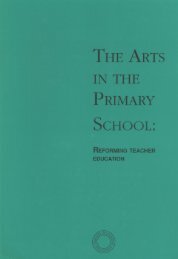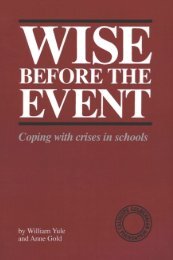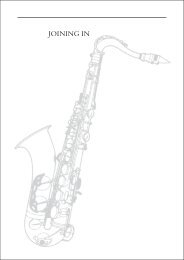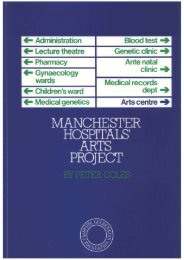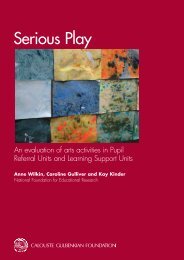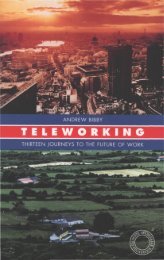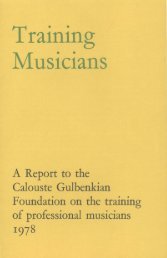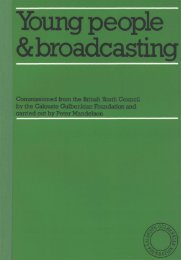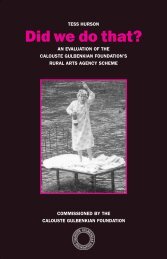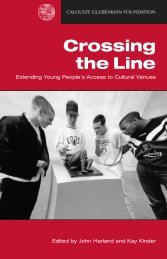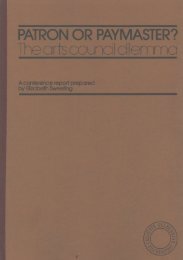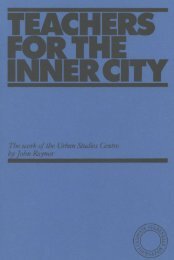The Arts in Schools - Calouste Gulbenkian Foundation
The Arts in Schools - Calouste Gulbenkian Foundation
The Arts in Schools - Calouste Gulbenkian Foundation
- No tags were found...
You also want an ePaper? Increase the reach of your titles
YUMPU automatically turns print PDFs into web optimized ePapers that Google loves.
techniques and resources for work<strong>in</strong>g with different agegroups.— Opportunities to develop personal <strong>in</strong>terests and practicalabilities <strong>in</strong> a chosen area of the arts.It follows, <strong>in</strong> all cases, that the use of the arts should beencouraged <strong>in</strong>, and be <strong>in</strong>cluded <strong>in</strong> the assessment of, allperiods of teach<strong>in</strong>g practice. We are not call<strong>in</strong>g here for allstudents to be tra<strong>in</strong>ed, aga<strong>in</strong>st other wishes, as arts specialists.We are urg<strong>in</strong>g that they be made aware, as part of theirformal studies, of the importance of the arts and of thepossibilities they present for enrich<strong>in</strong>g and enliven<strong>in</strong>g thewhole curriculum. We believe that no conscientious tra<strong>in</strong><strong>in</strong>gfor primary schools can leave these th<strong>in</strong>gs to chance.87 <strong>The</strong>need forspecialists<strong>The</strong> <strong>in</strong>sistent problem with specialist tra<strong>in</strong><strong>in</strong>g is that therelatedness of the various parts of the curriculum, and thepossibilities for <strong>in</strong>ter-discipl<strong>in</strong>ary work, are easily overlooked.Nevertheless, the <strong>in</strong>adequacy of a good deal ofarts teach<strong>in</strong>g <strong>in</strong> primary schools does call for more teacherswith specialised knowledge and skills to be appo<strong>in</strong>ted. Thiswould certa<strong>in</strong>ly help to raise the quality of work <strong>in</strong> <strong>in</strong>dividualclassrooms. What of the quality of work <strong>in</strong> the school as awhole?88 <strong>The</strong> We have emphasised the high quality of work <strong>in</strong> manyAdvisory schools and authorities. <strong>The</strong> work of the Advisory ServiceService has always played a key role here. <strong>The</strong> Adviser provides avital means of communication between schools and betweenthe different sectors of education across an authority. This isessential for the co-ord<strong>in</strong>ation of resources and policies andalso for the provision of appropriate <strong>in</strong>-service tra<strong>in</strong><strong>in</strong>g.Recognis<strong>in</strong>g that many primary teachers do not feel equippedby their general tra<strong>in</strong><strong>in</strong>g to teach dance, for example, theInner London Education Authority (ILEA) has sought toprovide <strong>in</strong>-service tra<strong>in</strong><strong>in</strong>g and support through:58a courses on specific aspects of dance — from s<strong>in</strong>glesessions to courses extend<strong>in</strong>g over several weeksb arrang<strong>in</strong>g for teachers of dance to visit schools towork with the class teachere occasional secondments of advisory teachers from aschool to work on particular dance projectsd arrang<strong>in</strong>g for selected dance groups to visit and work<strong>in</strong> schoolse enabl<strong>in</strong>g teachers to take groups of pupils to selecteddance performances <strong>in</strong> public theatres



